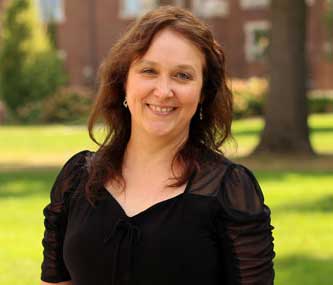 Dr. Tracy S. Farone
Dr. Tracy S. Farone
As director of The Bee Project at GCC, Grove City College Professor of Biology Dr. Tracy S. Farone is working on the leading edge of an emerging, critical area of veterinary medicine.
She has traveled the world – and been stung hundreds of times – to study of honey bees, other pollinators, and the conditions that impact their health, which have consequences far beyond the hive. On campus, Farone works with students to care for thousands and thousands of bees at the Oliver Apiary, where they gather essential data about hive health for their own research and national industry collaborations – and harvest hundreds of pounds of tasty honey.
Farone’s experience and contributions to the field earned her certification in honey bee medicine (Cert HbV) from the Honey Bee Veterinary Consortium (HBVC), a network of veterinary and animal science professionals committed to bee health, beekeeping, food security, judicious antibiotic use, and the well-being of all pollinators.
It is the first certification offered to veterinarians in the field of invertebrate health and marks a significant milestone in pollinator health and veterinary medicine, according to HBVC.
“It is an assurance to beekeepers that veterinarians have completed focused education and training in honey bee medicine and have a basic understanding of honey bee biology and disease,” Farone said.
Farone is one of just 10 people to hold the CertHbV designation and she and fellow members of the inaugural cohort will play a key role developing and overseeing the certification program to provide veterinarians with the specialized knowledge and skills to work with honey bee patients and beekeeper clients.
“This certification is especially timely. The winter of 2024 saw record-high overwintering losses of managed bee colonies across the United States, underscoring the urgent need for knowledgeable veterinary support in apiculture,” HBVC reported.
Healthy honey bee and other pollinator populations are important because of the critical role they play in agriculture. Annually, they pollinate $15 billion worth of crops in the United States each year, including fruits, nuts, and vegetables, and produce $3.2 million worth of honey, according to the United States Department of Agriculture. Honey bees are also critical biomonitors. As they pollinate plants they collect pollutants from the air, water, and soil, providing researchers critical information about overall environmental health.
Farone has been researching beekeeping and honey bee medicine since 2016, including taking a sabbatical that took her to France, Scotland, Montana, and throughout the Keystone State to study aspects of apiculture which allowed her to develop this new research program for the College.
In 2019 she established The Bee Project at GCC, a multifaceted interdisciplinary effort that advances student-faculty research and educates the public about honeybees and other pollinators. The goals of the GCC Bee Project are to improve knowledge and awareness regarding the importance of honeybee health in the fields of agriculture and public health, providing GCC students the opportunity to work directly with honey bees in the field and lab, through leadership teaching and conducting multiple individual research experiments. Farone hopes to expand technical student research projects with support from the College in the near future. Check out the video series on The Bee Project at GCC at youtube.com/GroveCityCollege.
Farone gives lectures at other colleges and universities, veterinary associations, organizational boards, and various bee associations around the country. She has written several textbook chapters and publishes monthly articles on honey bee medicine, including a monthly “Bee Vet” series for Bee Culture magazine. Her columns were published last year in a book “Honey Bee Vet: The Adventures of a Veterinarian Seeking to Doctor One of the World's Most Important Animals.”